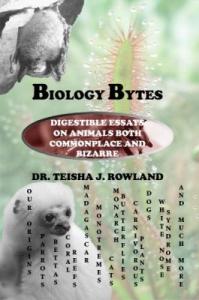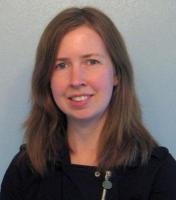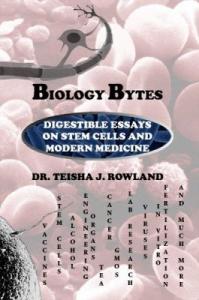Teisha J. Rowland: Biology Bytes
BIOLOGY BYTES: DIGESTIBLE ESSAYS ON STEM CELLS AND MODERN MEDICINE
Teisha J. Rowland, PhD (NASW member); Editor: Andrew J. Bonham, PhD
Lulu, self-published; August 31, 2013; paperback, 14.95; Kindle, $4.99
ISBN: 978-1304368621 (animals); ISBN: 978-1304275745 (stem cells)
I've always had a passion for biology, from large mammals to tiny stem cells. While completing my PhD at the University of California, Santa Barbara (UCSB), I shared that passion through a weekly column, "Biology Bytes," in the Santa Barbara Independent.
When I started writing the column, I was studying stem cells in the Molecular, Cellular, and Developmental Biology department at UCSB, in the laboratory of Prof. Dennis O. Clegg. I was so excited about stem cells and their potential that after working with them all day, I'd go home to learn more, often about types completely unrelated to my thesis project.
The more I discovered, the more I wanted to share my interest with other people. This is how several "Biology Bytes" essays came to explore stem cells. I also wrote about other biology topics, including extinct megafauna, the history of pets, carnivorous plants, our evolutionary origins, and lots more. I also explored the more troubling biology-related stories of our time, such as the decline of honeybees, bats, coral reefs, and amphibians.I explored the biology that's all around everyone, all of the time, but that often gets overlooked, or misunderstood. I tried to make even complex biological topics, like bioengineering organs or making vaccines against cancer, understandable.
Because the column caught the interest of many readers who enjoyed reading about science, I decided to self-publish the articles as a completely updated and revised series in two separate books.
Biology Bytes: Digestible Essays on Animals Both Commonplace and Bizarre addresses the critters all around us. These range from ones close to us, such as our pets, or pesky snails we encounter in our gardens, to more distant considerations, like insects that make our silk fabrics, the evolution of our species, the Neanderthals (with whom our ancestors bred as recently as 37,000 years ago), or unfamiliar amphibians facing extinction. I tried to break down complex science into key points, explain jargon, provide pictures of amazing creatures throughout, and, where applicable, tell readers how to take action.
Biology Bytes: Digestible Essays on Stem Cells and Modern Medicine covers the latest research on stem cells, their promise and controversy, as well as related topics in medical science, such as in vitro fertilization (a technique responsible for over 1% of U.S. births today), how and why GMOs are made, the creation of vaccines to fight cancer, and fascinating food science behind delectable drinks such as beer, wine, and tea. It's a collection of lay-language essays, with illustrations, diagrams, and recommendations for further reading.
Contact info:
- Teisha J. Rowland, 303-859-4367, teisha42@gmail.com
- Book website: http://www.biology-bytes.com/book/
- Blog website: http://www.biology-bytes.com
- Book Twitter handle: @teisha42
- Book Facebook page: http://www.facebook.com/RowlandBiologyBytes
- Agent: None
Will your book be published soon?
Send info and images to Lynne Lamberg, NASW book editor, llamberg@nasw.org.






